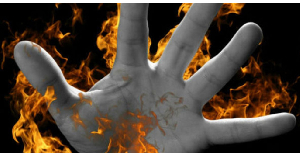The scene was quite moving. Old men and women, some with babies on their backs, students and other rights activists wrenched through the scorching sun of Monday 11 April in Accra to send the right signals to the IMF and World Bank that poor countries are tired of being reduced to punching bags.
This peaceful procession, comprising rice and poultry farmers from various parts of the country formed part of activities marking this year's Global Week of Action.
"Our eyes are red, save our farms, save our livelihoods", was the song that greeted the officials of the World Bank, who braced out of their offices to receive the petition.
John Akparigu, a rice farmer from the Upper East Region told the Deputy Speaker of Parliament, Freddie Blay who received the petition that every plate of imported rice sends 100 children out of the class to the streets because, many rice farmers , as other farmers have been compelled to abandon their farms due to the killing effects of trade liberalization.
On behalf of Ghanaian farmers he appealed to parliament to be sensitive to issues of national interest, such as the imposition of import tariffs on foreign rice and poultry, but which had to be withdrawn because of incessant pressure from the International Monetary Fund.
In other words Ghanaian farmers were telling the World Bank, the IMF and rich countries that 'free market' and 'trade liberalization' are the biggest challenges confronting a poor country like Ghana, where 70 percent of the population is into farming.
The so-called rich countries preach freedom of everything, except trade. The result is that poor farmers cannot compete with farmers of the European Union and the United States of America, whose governments pay huge subsidies to their farmers.
Ghana in the 1970s was self-sufficient in rice production. But the pressure from the IMF, World Bank, WTO, transnational corporations and governments of the rich countries has turned Ghana into a net importer of rice, thanks to the removal of subsidies on agriculture. At the heart of the decline in agriculture in Ghana, as in other African countries is the dismantling of government marketing boards and the exposure of local farmers to cheap imports. Another trick has been to maintain high tariffs on processed food from poor countries and in doing that stifling the development of new 'value added' industries in developing countries.
In Ghana for instance, the importation of 24,077 tonnes of tomato paste from Europe in 2003 has worsened the plight of tomato farmers. The closure of the Wenchi and Pwalgu Tomato factories is a vivid example of the harmful effects of trade liberalization.
Consider the plight of Agatha Yumbia. She has a small chicken farm in a small village in southern Ghana. She started her business with a loan from her local church, when her husband died, but competition from cheap imported poultry has all, but killed her business. She traveled all the way from her village to participate in the Global Week of Action. The message on her placard was clear : Protect National Sovereignty and Support Poultry Farmers" . She is right.
In 2002 alone, more than 27,000 tonnes of chicken was imported into the country, mostly from European countries. Yumbia has managed to keep some of her local customers, but in the face of cheap imports, she is beginning to contemplate the future of her business. According to her, a local fowl now costs 70,000 cedis, against 20,000 cedis for a kilo of imported fowl.
The same goes for local rice farmers. Like poultry farmers, they find it difficult to compete against foreign rice, which Ghana imports to the tune of 314,626 tonnes or more every year. In an attempt to ease the pain of Ghanaian farmers, the government in the 2003 budget made provision for an increase in the tariffs on rice and poultry. But the tariffs were never implemented because within days of parliament passing Act 641, the IMF put pressure on the government to withdraw it. Government obeyed its master and that was it. Government on March 18 used its strength in parliament to repeal the Act 641, when it was clear that it would lose a case brought against it by poultry farmers in Accra.
It was clear that if Ghana went ahead to implement the new tariffs, it would have stepped on the powerful toes of the free-trade promoting IMF and World Bank. Here in lies the dilemma facing a country that had so much promise at independence, but has been reduced to an ideological punching bag.
The legitimate question is who elected the IMF and World Bank to determine the destiny of Ghana? In 2002, IMF suspended financial assistance to Ghana because of a dispute over an increase in teachers' pay. The World Bank and other donors followed suit. Ghana however, has no influence over the voting pattern in IMF. As a poor country, Ghana has only 0.18 per cent of the vote. Meanwhile the United States, whose interest the IMF is promoting has almost a third of the votes.
The IMF currently 'ranks' countries according to their compliance with liberalization policies. This ranking influences their access to virtually all forms of credit. With the recent deregulation of petroleum pricing, Ghana has chalked another feat in liberalization and will most likely get more credit, but is it for good or for worse?
No doubt, debt has become a major tool for controlling poor countries like Ghana. As Ghana became indebted in the 80s and 90s, all the IMF/World Bank did was to give more loans and conditionalities - liberalising the economy, opening up the domestic market, devaluation of the currency and more cuts in government spending.
These cuts in government spending obviously affected education, health, nutrition and welfare. Poor countries have over the years been compelled to overlook food production and produced cash crops that were in high demand in the west. These were meant to earn more foreign exchange to service debts. The result is what the country is faced with. One year of abundance of food and another of scarcity. And worse of all the loss of livelihoods for many farmers, as the country took to importing food. Knowing that poor countries depend on proceeds from primary commodities, the champions of free trade manipulate the prices to the disadvantage of poor countries.
Then they come in another form talking about poverty alleviation and safety nets. Although the IMF and World Bank speak about safety nets, their policies of cutting government spending tends to hurt the very poor they claim to be working for. And that is why we have more children of school going age on the streets selling dog chains and PK chewing gum.
Free market doctrine according to Robert Mcchesney comes into two varieties. "The first is the official doctrine imposed on the defenceless". The second is what he called really existing free market doctrine, "market discipline is good for you, but not for me, except for temporary advantage."
General News of Monday, 18 April 2005
Source: Public Agenda












